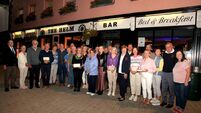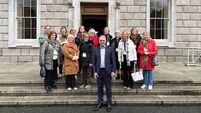Ballyhaunis: Local Supermac's franchise sees rise in sales in 2024

Supporters from Ballyhaunis of newly-elected Fine Gael TD Keira Keogh at the count centre in the TF Royal Theatre in Castlebar, from left: John Prenty, Ivan Fair, Joan Jennings, Shane Keogh and Grace Keogh. Picture: Michael McLaughlin
The local Supermac’s outlet is expecting a 5% to 10% increase in sales in 2024 compared to 2023, with passing trade from the GAA Centre of Excellence key to the performance, according to franchise owner and manager Dinal Swaris.
The number of customers coming through the door will be up 3% on 2023 figures but sales will be up by between 5% and 10%.
“It’s not too bad, the trade is steady," he said. "After the mid-terms it’s quiet but then Christmas starts and people start doing their shopping and business picks up.”
Notably, customer habits remain altered since Covid lockdowns.
“The night trade has collapsed since Covid as people’s going out habits changed. In smaller towns there is no longer any late-night business, we don’t stay open late, only our Galway city stores open late now.”
The higher cost of living continues to reverberate locally, noted Mr Swaris, making dining out an occasional rather than a daily consumer habit.
“If they want a treat they will come out...”
Mr Swaris has seen footfall in Ballyhaunis diminish as smaller retail outlets continue to close. Passing through traffic, particularly teams visiting the Connacht GAA Center of Excellence, helps a “huge amount".
“They’ll often call us and let us know they’re coming in. They also spend in other shops in Ballyhaunis.”
A new surge of town centre rental accommodation – much of it former retail properties - is bringing some business to Supermacs.
"They [renters] will often go for a Friday night or a Sunday treat.”
Supermacs is also facing more competition, especially from retailers.
“You’re not only competing with fast food but also with convenience retailers. There’s more competition: a Centra takeaway dinner costs €9 and our meal with drink is €10.50.”
As a result, every business is widening its offerings.
“We added Papa John’s in 2023 because it was hard to survive on Supermacs alone.”
Some 15% to 20% of Mr Swaris’ sales now comes from pizzas but the new offerings also requires more labour.
“We have two people doing the pizzas. The wider you go the more work is involved.”
On that front he is expecting higher costs in 2025 due to an increase in the minimum wage and other labour reforms.
“Definitely, PRSI is increasing and the sick pay entitlement will increase from three to five sick days.”
Mr Swaris expects stronger trade in the run up to Christmas.
“It’s quieter because they’re more conscious of spending because they want to save for Christmas. A few [social welfare] payments are coming in too so it’ll pick up.”
A local music teacher is spearheading a weekly vigil for Palestine which started in the Square in Ballyhaunis last month.
Rachel McGeehan said that “after watching the news every day coming out of Gaza and the West Bank and feeling so affected and moved by what I was bearing witness to” she felt “compelled” to show her solidarity with the Palestinian people in a local setting. Thus, her decision to invite like-minded people to stand in the Square on Friday afternoons.
“Especially in a town as culturally diverse as Ballyhaunis, I really wanted to start something locally. In the summer of this year, some new neighbours moved in, and they are from Palestine, this really propelled me into action, I felt like it was my sign to take a step forward.
“I am in some groups based in Dublin and even Glasgow, and within the Mayo branch of IPSC - a lot of the vigils are taking place in Castlebar and Westport. With a young child, the distance and timings wasn't really available to me.
"Abaigeal Warfield (of Dragonfly Yoga) and Emer Tansey and myself organised an Oiche Shamhna Toddler Fundraiser with great support from local businesses and the free use of the Community Hall from Ballyhaunis Community Council. But I wanted to keep it going, to have a sense of momentum, to keep Palestine in people's minds, to create a 'space' where people can come together in solidarity, for support.
“We have had two vigils in Ballyhaunis Square so far, and have decided to show up every week from 4pm to 5pm with flags, banners and open hearts, to let people know there is a place they can come too if they are feeling the same way. We have had a lovely positive response from cars and passers-by, with beeps, thumbs up, some cheering.”
Originally from Dublin, Rachel moved to the UK as a child with her family before later returning to Ireland do a music degree and masters. After teaching in Abu Dhabi for six years she moved to a house in Ballyhaunis during the pandemic in 2020.
“As a performer I have played with a number of orchestras, and shared the stage with the likes of Andrea Bocelli, George Fenton and Hussain Al Jassimi,” she said.
The recently deceased Mohammed Hani Kezze was a pioneer in many ways, being the first Syrian to settle in Ballyhaunis but also a pioneer in the casings industry, turning a byproduct from the local meat processing industry into a valuable commodity exported worldwide.
“His brother had come before him and told him there was an opportunity here,” explained Mohammed’s son, Hazim Kezze who today runs the family business, Iman Casings, in Ballyhaunis. Another son, Housam runs a UK branch of the business.
A native of Aleppo in western Syria, Mohammed had learned the craft of cleaning and salting animal intestines for use as casings for sausages. The establishment of a meat factory in Ballyhaunis by Pakistani businessman Sher Mohammed Rafiq in the late 1970s created a supply of by-products for other ends of the meat industry.
Rafiq’s sales of carcasses in continental Europe created new business connections and partnerships.
“It was a French guy doing business with Rafiq, this guy heard there was a meat factory in Ballyhaunis and he wondered what they were doing with the casings. He told my dad’s brother.”
Mohammed had been working in Spain but had returned to Syria and had gotten engaged, explained Hazim.
“His brother called him and said there’s a factory in Ireland which you should have a look at, see if there’s an opportunity there.
“When he came to Ballyhaunis he wasn’t planning to stay long term. The first thing he saw was the cold weather. He intended to go back and that’s why he worked by himself in the early years.
Purchasing the intestines from Mr Rafiq’s Halal meat factory, Mohammed cleaned and stripped them before salting them. Then they were ready for sausage meat. Kezze exported the casings across Europe but also to the Middle East.
“My father saw phenomenal growth in his sales in the first five years during which time he worked mostly alone. It took him a while to realise this was the place he would stay. But then he began to take on Irish staff. He taught them the trade.”
Tributes posted online after his death include reflections from Ballyhaunis locals who worked for Mohammed in the early years, a time when local employment opportunities were fewer than those available today when Ballyhaunis' meat processing industry relies on a largely immigrant workforce. While the country’s broader economy stagnated, there were a lot of opportunities in the early 1980s in Ireland as the country’s meat processing industry came of age, explained Hazim.
“Ireland was becoming one of the most important producers of meat and meat by-products. A few plants had been built, including Halal. My dad saw the opportunity because no one else was doing these [casing] products.
“Those were early days. Today the Irish meat industry is a ten billion euro industry but before that farmers were bringing a couple of cows for slaughter at the local abattoir. Then the meat factories opened up and were killing hundreds or thousands of animals a day.”
Mohammed Hani Kezze was a polyglot with clients across Europe, and later in China. His was a long connection with Spain, where he’d gone as a 19-year-old and worked in the casings industry.
“He learned the language, he used to always speak Spanish with his customers,” explained Hazim.
“As a businessman he was old school. He was friends with his customers. They’d visit and he’d visit them. He’d go to Spain and sign a deal for one or two million, he’d just go over and chat with his friend.”
When he passed away in November at the age of 71, Mohammed had also had a profound impact on the demographic makeup of Ballyhaunis. Forty-four years after he arrived to check out the Halal meat plant there are now between 300 and 400 Syrians in Ballyhaunis, Hamid estimates.
A wing of the family, the Cherbatjis, run Nour Foods, a meat business, from the premises on Clare Street previously occupied by Iman Casings before it moved in 2011 to its current site, a purpose-built plant on the Clare Road built with support from LEADER, the EU-state funded programme for rural development.
Today Iman Casings employs 25 at its Ballyhaunis plant and 46 at its operations in the UK. A smaller casings company, RC Casings, is run by a former Irish associate of Hamid’s and processes pork casings.
“He left us debt free... he brought us into the trade,” says Hazim in tribute to his father. "He turned what was effectively a waste product into something valuable. We went from €50,000 to €100,000 to millions of euros in sales per year.”
The business is counter-cyclical, expanding when the broader economy contracts. Staff numbers and sales soared during the economic crash of the past decade.
“People eat less steak and more sausages in an economic downturn,” explains Hamid.
A stronger economy also makes finding and retaining staff a challenge and recent increases to the minimum wage adds pressure, Hazim explains.
“It’s labour intensive work, our products are hand-made... People prefer to work in Aldi for €13 or €14 an hour.”
The company is more reliant now on exports. France and Spain remain key markets while Irish sausage makers have embraced an alginate gel derived from seaweed to make casings.
Having grown up adjacent to the workplace, the family left Clare Street in 2011 to move into a house on the Knock Road. In the last ten years, his father wasn’t very active in the business, explained Hazim. He travelled a lot, spending half of the year at a house he’d purchased in Spain. He had booked a trip to Wales to visit his younger son, Hussain, before heart trouble took his life. The evening he died he’d been eating paella, his favourite dish, Hazim relates.
Mohmmad had also travelled to Syria six or eight months ago for the first time in a long time. All that’s left now in Aleppo are distant relatives: the closer family all live in Ballyhaunis now.
“He loved it. He was planning to go back.”
Hazim was alarmed in recent weeks to see the ancient city fall to rebel fighters.
“It’s a 10,000-year-old beautiful city fall. Now it’s gone, gone.”
Congratulations to P&J, c/o Paddy's Bar, winners of €500 in the Ballyhaunis GAA 50/50 draw on December 1st on an envelope sold in Paddy's Bar. The next draw, on December 8th, is in Paddy's Bar.




